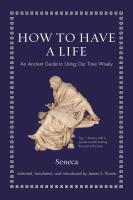
Princeton (2022) h/b 195pp £14.99 (ISBN 9780691219127)
A friend, with no classical background, visiting your reviewer, was left to his own devices for half an hour. He was then found engrossed in the book under review, which he had (probably faute de mieux) picked up from a side table.
‘You know,’ he volunteered, as if surprised that a book written in a foreign language two millennia ago could have any relevance today, ‘that chap Seneca writes an awful lot of sense.’
This unsolicited testimonial is a clear vindication of Princeton’s decision to commission the excellent series ‘Ancient Wisdom for Modern Readers’. This volume is edited, introduced and translated by James S. Romm, Professor of Classics at Bard College, New York, who with acclaim has earlier contributed a number of volumes in the series.
The subject is the wise use of time; the works under consideration are Seneca’s De Brevitate Vitae and Moral Epistle 1, both in full, and extracts from Moral Epistle XLIX. As regularly in the series, the original text is printed on the left hand pages and a fresh translation on the right.
This is a thoroughly scholarly piece of work, but does not offer itself as a work of heavy scholarship. There is no apparatus criticus, no bibliography, no index, and the notes are brief and to the point, mainly explaining historical or literary allusions or the choice of a word or phrase in translation. It is strongly bound and handy size for a large pocket or handbag.
The introduction places Seneca in his historical context and outlines his argument that too many people complain about the shortness of time available to them, when they, in fact, waste a large proportion of it by letting others steal it from them, feeling obliged to react to the demands of others, whom they wish to impress or whose influence they wish to court in the empty pursuit of wealth, prestige or office. Likewise others waste it in the pointless study of irrelevant scholarly minutiae, an argument which R. charmingly notes reflects on his own profession!
R. notes the problem of how far Seneca’s life ‘measured up to his ideals’. Did not Seneca himself acquire wealth, prestige and office? The question of whether Seneca was a hypocrite or someone who wistfully acknowledged the inevitable tension between reality and aspiration, is left for the reader to decide.
The inclusion of the Latin text enables aspiring students to develop their appreciation of Seneca’s style, which R. characterises as ‘streamlined, hard hitting prose’. He writes ‘I have tried to convey the feel of that prose even at the risk of producing an unnatural sounding English’. It is true that R.’s translation is committed to dynamic rather than literal equivalence. He is the master of the eye-catching phrase, to give two examples: exercitus ad externa bella convertit is rendered ‘Augustus unleashed the armed forces… on foreign wars’, and isti qui per officia discursant becomes ‘Those who trot about on their errands’.
The use of American English with the word ‘gotten’ on a number of the occasions and the spelling words such as favor and honor may momentarily distract the British English reader, but it is a very small price indeed to pay for such a lively and sometimes arresting translation.
The problem with how to use our time wisely is exhaustively laid out by Seneca with copious examples of the misuse of time. The solution is more briefly addressed. The contrast is between the occupati (‘the preoccupied’) and the otiosi (‘people enjoying true leisure’). The latter devote themselves to sapientia (which R. translates as philosophy), and reflect on the true meaning and purpose of life, which is to be measured in terms of quality, not quantity. Seneca would certainly have approved of the motto of at least one hospice which counsels ‘It’s the life that you put into each day that counts’.
Once again Princeton University Press and Professor Romm have put us in their debt.
Ray Morris
